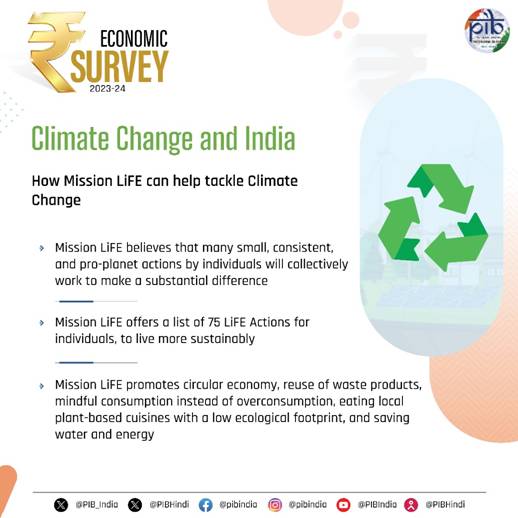Economic Survey Calls for Localized Climate Change Solutions, Critiques Western Approaches
The Economic Survey 2023-24, tabled by the Union Minister for Finance and Corporate Affairs, Nirmala Sitharaman in Parliament today, takes a critical view of the Western approach to tackling climate change. The document urges all developing countries to view the climate change issue through a 'local lens'. It argues that a 'one-size-fits-all' approach is ineffective, and developing countries should have the freedom to choose their own pathways as they balance developmental goals with meaningful climate action.
The survey states that current global strategies for climate change are flawed and not universally applicable, pointing out that adopting Western practices could be disastrous for India where culture, economy, and societal norms are already intertwined with the environment.
Despite India's significant strides in climate action, the survey notes that the country often faces criticism for not aligning with Western solutions. This criticism stems from a lack of appreciation for India's unique social and cultural fabric, which is already rich with sustainable development ideas. It points out inconsistencies where the Western prescriptions for tackling climate change do not hold globally. The Western approach focuses on substituting means to achieve overconsumption rather than addressing the root problem of overconsumption itself.
The survey criticizes the global pursuit of energy-guzzling technologies, such as Artificial Intelligence and mining for rare earth minerals, which contribute to higher fossil fuel consumption, directly at odds with the objectives of climate mitigation. It also highlights that lifestyles in developed countries often ignore the fundamental human relationship with nature, other people, materiality, and themselves.
Highlighting sustainable alternatives, the survey discusses the process of meat production in the developed world, which presents credible food security risks and threatens to permanently degrade critical natural resources. It suggests that traditional farming practices from the developing world, integrating several agricultural activities with livestock rearing, can provide solutions by repurposing farm waste as animal feed, thus lowering the environmental cost of meat production and balancing the natural cycle.
The survey also criticizes the adoption of nucleated families akin to the Western model, which places significant land and resource demands on the environment. It advocates for a shift towards traditional multi-generational households that offer sustainable housing solutions by using local materials and labor, promoting well-ventilated spaces, and reducing energy requirements.
Further, the survey introduces Prime Minister Narendra Modi’s vision of Mission LiFE, which embodies a ‘Lifestyle For Environment’ that seeks to address the ‘wants’ of people without harming nature. This approach emphasizes individual responsibility in combating climate change. The Mission encompasses a comprehensive list of 75 LiFE Actions for individuals to adopt for more sustainable living, promoting mindful consumption, a circular economy, and the reuse of waste products.
The survey quotes the International Energy Agency, stating that the adoption of actions promoted by the LiFE initiative could reduce annual global carbon dioxide emissions by more than 2 billion tonnes in 2030 (20% of the emissions reductions needed by 2030) and save consumers about USD 440 billion.
In conclusion, the survey document upholds the tenets of Mission ‘LiFE’, asserting that the global movement on climate change must be accommodative of sovereign choices and economic needs, but centered on individual behavior. ‘It’s time to rebuild societies with equanimity’, it adds.


